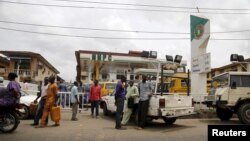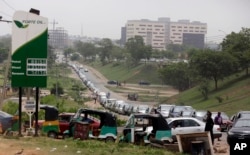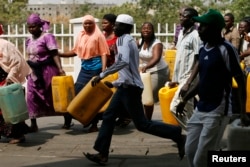Nigerian labor and civil society groups were still planning to go ahead with a strike Wednesday over a 70 percent increase in gasoline prices, despite a court-issued injunction that they not take such action.
Talks between the government; the Nigeria Labor Congress, which represents millions of workers; and the other union that previously threatened to strike, the Trade Union Congress, broke down late Tuesday. The TUC said it would not join the strike.
The government issued a statement in which it said the NLC's decision was regrettable in light of the court's decision. "Government, therefore, calls upon and advises all workers to respect the laws of the land and to desist from participating in an illegal strike action," said David Babachir Lawal, a government secretary.
The gas price increase was caused by the removal of a government subsidy. Ministers hoped the move would help tackle the worst economic crisis in decades in Africa's biggest oil producer, brought on by the fall in crude prices, and fund fuel imports needed because Nigeria's refineries have been neglected for years. Nigeria refines only enough crude to provide half its needs.
Government negotiator Adams Oshiomole said subsidizing fuel is bad policy. Even with population growing at only 3 percent per year, consumption has expanded so much that Nigeria is spending the equivalent of $6 billion a year on the subsidy, he said.
But Abiodun Aremu, secretary general of the labor and civil society coalition, said the government must pull back the price increase before an agreement can be reached.
A fall in oil prices has eaten into the foreign reserves of Nigeria, which relies on crude sales for around 70 percent of national income. The central bank has adopted a fixed exchange rate to protect further depletion of reserves.
On Tuesday, Vice President Yemi Osinbajo said President Muhammadu Buhari had been "left with no choice" but to raise prices. "What can we do if we don't have foreign currency? We have to import fuel," he said.
Nigeria is even more cash-strapped now than it was in 2012 when the previous administration tried to remove the fuel subsidy. A nationwide strike and days of street protests forced the government to reconsider.
VOA's Chima Nwankwo contributed to this report from Abuja. Some information came from Reuters and AP.







